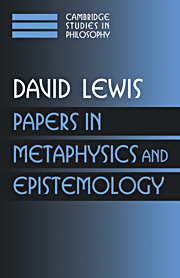Book contents
- Frontmatter
- Contents
- Introduction
- 1 New work for a theory of universals
- 2 Putnam's paradox
- 3 Against structural universals
- 4 A Comment on Armstrong and Forrest
- 5 Extrinsic properties
- 6 Defining ‘intrinsic’ (with Rae Langton)
- 7 Finkish dispositions
- 8 Noneism or allism?
- 9 Many, but almost one
- 10 Casati and Varzi on holes (with Stephanie Lewis)
- 11 Rearrangement of particles: Reply to Lowe
- 12 Armstrong on combinatorial possibility
- 13 A world of truthmakers?
- 14 Maudlin and modal mystery
- 15 Humean Supervenience debugged
- 16 Psychophysical and theoretical identifications
- 17 What experience teaches
- 18 Reduction of mind
- 19 Should a materialist believe in qualia?
- 20 Naming the colours
- 21 Percepts and color mosaics in visual experience
- 22 Individuation by acquaintance and by stipulation
- 23 Why conditionalize?
- 24 What puzzling Pierre does not believe
- 25 Elusive knowledge
- Index
9 - Many, but almost one
Published online by Cambridge University Press: 08 February 2010
- Frontmatter
- Contents
- Introduction
- 1 New work for a theory of universals
- 2 Putnam's paradox
- 3 Against structural universals
- 4 A Comment on Armstrong and Forrest
- 5 Extrinsic properties
- 6 Defining ‘intrinsic’ (with Rae Langton)
- 7 Finkish dispositions
- 8 Noneism or allism?
- 9 Many, but almost one
- 10 Casati and Varzi on holes (with Stephanie Lewis)
- 11 Rearrangement of particles: Reply to Lowe
- 12 Armstrong on combinatorial possibility
- 13 A world of truthmakers?
- 14 Maudlin and modal mystery
- 15 Humean Supervenience debugged
- 16 Psychophysical and theoretical identifications
- 17 What experience teaches
- 18 Reduction of mind
- 19 Should a materialist believe in qualia?
- 20 Naming the colours
- 21 Percepts and color mosaics in visual experience
- 22 Individuation by acquaintance and by stipulation
- 23 Why conditionalize?
- 24 What puzzling Pierre does not believe
- 25 Elusive knowledge
- Index
Summary
THE PROBLEM OF THE MANY
Think of a cloud – just one cloud, and around it clear blue sky. Seen from the ground, the cloud may seem to have a sharp boundary. Not so. The cloud is a swarm of water droplets. At the outskirts of the cloud the density of the droplets falls off. Eventually they are so few and far between that we may hesitate to say that the outlying droplets are still part of the cloud at all; perhaps we might better say only that they are near the cloud. But the transition is gradual. Many surfaces are equally good candidates to be the boundary of the cloud. Therefore many aggregates of droplets, some more inclusive and some less inclusive (and some inclusive in different ways than others), are equally good candidates to be the cloud. Since they have equal claim, how can we say that the cloud is one of these aggregates rather than another? But if all of them count as clouds, then we have many clouds rather than one. And if none of them count, each one being ruled out because of the competition from the others, then we have no cloud. How is it, then, that we have just one cloud? And yet we do.
This is Unger's (1980) ‘problem of the many’. Once noticed, we can see that it is everywhere, for all things are swarms of particles.
There are always outlying particles, questionably parts of the thing, not definitely included and not definitely not included. So there are always many aggregates, differing by a little bit here and a little bit there, with equal claim to be the thing.
Information
- Type
- Chapter
- Information
- Papers in Metaphysics and Epistemology , pp. 164 - 182Publisher: Cambridge University PressPrint publication year: 1999
Accessibility standard: Unknown
Why this information is here
This section outlines the accessibility features of this content - including support for screen readers, full keyboard navigation and high-contrast display options. This may not be relevant for you.Accessibility Information
- 28
- Cited by
